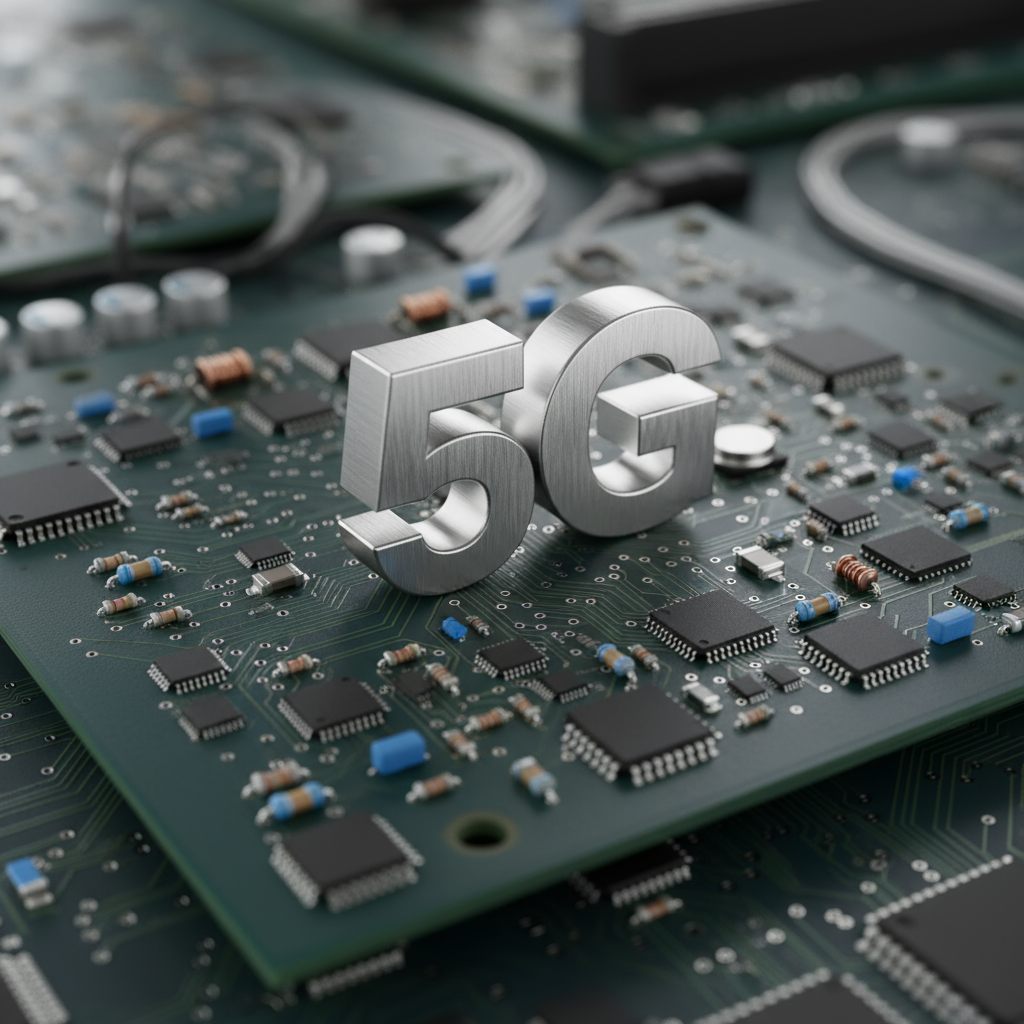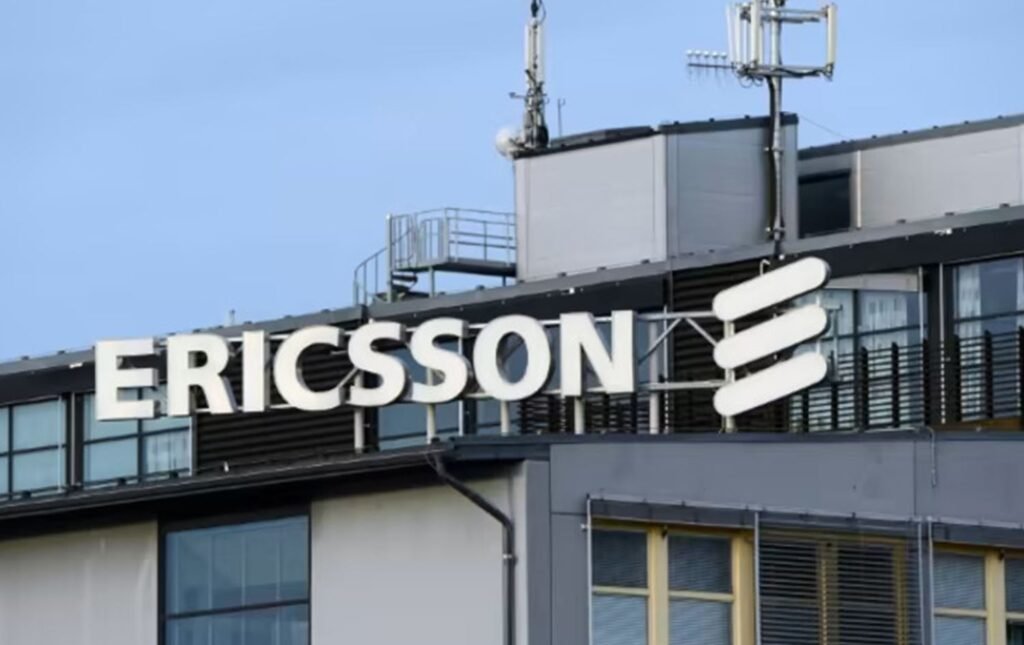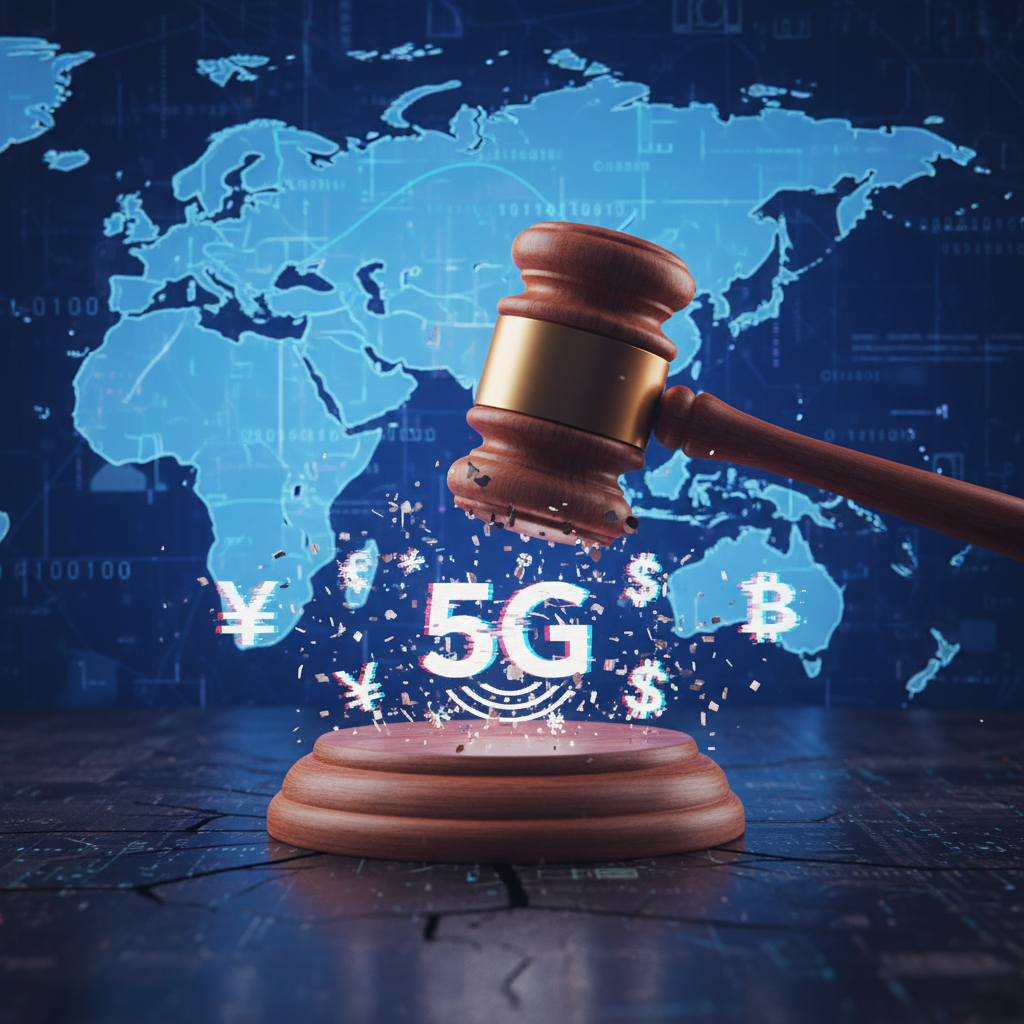The rollout of fifth-generation (5G) wireless networks across the Asia-Pacific (APAC) carries enormous economic promise and, investigators warn, equally enormous risks of graft. 5G’s advanced capabilities (illustrated below) depend on a few slices of radio spectrum, which governments auction off to the highest bidders.
But these auctions involve massive sums and geopolitical influence, creating fertile ground for corruption.
An investigative inquiry about Corruption in 5G Spectrum Auctions Across APAC reveals allegations and confirmed cases of malpractice tied to 5G spectrum allocation in India, Malaysia, Indonesia, Thailand, Vietnam and beyond. These include whistleblower claims, parliamentary probes and court cases often linked to the giant telecom vendors vying for market share.

The high value of 5G spectrum has made auctions intensely competitive worldwide.
Corruption in 5G Spectrum Auctions In India
India’s 2022 5G spectrum auction drew immediate controversy. Opposition figures, recalling the infamous 2008 “2G scam”, loudly accused the government of foul play. Former Telecom Minister A. Raja of the DMK party called it a “very big scam” and demanded an inquiry, saying bids of only ₹1.50 lakh crore (~US$18bn) seemed far below market value. (Raja quipped that selling 51GHz of 5G spectrum for ₹1.5 lakh crore looked like a good deal even for his old 2G-era estimates.)
In response, Telecom Minister Ashwini Vaishnaw pointed out that unsold frequencies about ₹2.81 lakh crore worth remained with the government, and that what was sold had fetched ₹1.50 lakh crore. “How does that become a scam?” he said, urging critics to consider market demand and pricing rather than conspiracy.
Key controversies in India’s 2022 auction:
Opposition allegations: DMK’s Raja claimed the auction should have raised ₹5–6 lakh crore based on demand, suggesting collusion with companies to suppress bids. He pressed for a full investigation.
Government rebuttal: Officials stressed that unsold spectrum remained state-owned and pointed to conservative carrier bidding as normal. Vaishnaw emphasized “the sold spectrum was valued at Rs 1,50,173 crore and the unsold spectrum at Rs 2,81,432 crore”.
Historical context: Critics of the “5G scam” comparison have noted that India’s 2G casem which Raja once spearheaded was later thrown out by courts. A special court acquitted all accused in 2017, finding earlier loss estimates “exaggerated”. Even Congress leaders privately questioned the 2G accusations in hindsight.
In practice, no formal anti-corruption investigation has been launched in India over the 5G auction. Some fact-checkers have debunked viral rumors (such as a false ₹2.8 lakh crore “scam” figure), noting that the spectrum went unsold because operators simply did not bid more. Analysts say the outcome reflects market realities and that dredging up the discredited 2G episode may have been politically motivated. As of mid-2025, India’s 5G rollout continues on schedule, and regulators emphasize technical reviews over graft probes.
Corruption in 5G Spectrum Auctions in Malaysia
By contrast, Malaysia’s 5G initiative has been mired in political drama. The government created a single wholesale network (Digital Nasional Berhad, DNB) to manage 5G spectrum and infrastructure. In principle, the licences (and spectrum) were given free to DNB to speed rollout. The auction itself drew little outright scandal. However, the contracts to build and operate DNB’s network have come under fire after the global
“Ericsson List” revelations of alleged fraud. In late 2022 and 2023, Reuters and the International Consortium of Investigative Journalists reported that Ericsson’s own documents suggested possible terror financing and wide-scale corruption abroad. Malaysian lawmakers swiftly seized on this, demanding scrutiny of the DNB–Ericsson deal.
Opposition MP Fahmi Fadzil of the Pakatan Harapan coalition asked Malaysia’s Anti-Corruption Commission to probe the ten-year, multi-billion-ringgit contract. He warned it might turn into “the same thing” as the notorious 1MDB financial scandal. “Are we going to see the same thing with DNB and Ericsson?” Fahmi asked in parliament.
Fahmi noted that billions in taxpayer-guaranteed sukuk (bonds) are being sold to finance DNB’s purchase of Ericsson gear, raising questions about whether the process was transparent. (He cited reports that some funding might have passed through an Islamic bank connected to questions about terrorism finance.)
The government has strongly defended the DNB arrangement. Communications Minister Gobind Singh Deo told parliament that the Malaysian Anti-Corruption Commission’s due diligence found DNB’s procurement “in order,” and that the deal had been publicly disclosed. Other officials pointed out that no cabinet minister has a personal stake in DNB’s contracts. Still, criticism has lingered.
Former deputy minister Ong Kian Ming filed parliamentary questions seeking the contract score sheets and tender detailst. Analysts note that unlike a typical auction, Malaysia’s spectrum assignment effectively cost the winners (the telcos and their foreign partners) nothing upfront, which has political and economic implications.
Key points in Malaysia’s 5G saga:
Ericsson investigation spillover: Calls for probe came after Swiss and U.S. probes into Ericsson revealed billions paid abroad under “suspicious” circumstances. Opponents fear hidden kickbacks.
Political statements: In mid-2023, Fahmi Fadzil publicly compared the DNB deal to 1MDB and demanded audits. The government insists all checks are passed.
Network model: Malaysia’s single wholesale network model (free spectrum to DNB) means the entire 5G infrastructure contract pipeline flows through DNB’s chosen vendors (Ericsson and subsidiary companies). Skeptics ask if this limited bidding could conceal impropriety.
As of now, no Malaysians have been charged with wrongdoing specifically over 5G. But Malaysia’s episode underscores how vendor-related scandals elsewhere can taint domestic projects. It also raises a red flag: even in a highly regulated system, transparency gaps can fuel suspicion.
Corruption in 5G Spectrum Auctions in Indonesia
Indonesia has not reported graft in its 5G licensing per se, but the telecom sector has been rocked by a massive corruption scandal in 2023. In May 2023 authorities arrested Communications Minister Johnny G. Plate, accusing him of accepting bribes in a rural telecom project (building 4G towers) that ultimately failed. Prosecutors say the state lost about IDR 8.32 trillion (~US$560 million) on the scheme. Only 985 towers of the planned 7,904 had been built before an audit found the network effectively “unusable”.
Notably, the probe reached into corporate ranks. Media reports indicate that a Huawei Indonesia executive was among those questioned alongside Plate. (Huawei issued a statement later clarifying that “nothing wrong” was done by its staff, but Indonesian police named one Huawei manager, Mukti Ali, as a suspect.)
The crackdown spread beyond telecom ministry officials: even Indonesia’s anti-graft commission noted that the wrongdoing reflected “a continuing blight on Asian economic development”. President Widodo swiftly replaced Plate and vowed reforms, and Transparency International pointed out that corruption control in Indonesia had slipped (Indonesia ranked 110th on the CPI).
While this scandal involved 4G infrastructure, its reverberations affect 5G plans too. The arrested minister had been overseeing broad telecom policy, and operators now know the spotlight is on. Indonesia’s 5G spectrum auction conducted in 2021 by the regulator has not itself been formally implicated in bribery. But industry experts say carriers will face stricter scrutiny: any claims of irregularity in spectrum sales would have to contend with the narrative of recent graft.
Indonesia key scandal (2023):
Arrest of Communications Minister Johnny Plate for alleged bribery in a rural 4G tower project.
Audit findings: Only a fraction of towers completed; Coordinating Minister Mahfud MD described the resulting service as “unusable”.
Vendor involvement: A Huawei Indonesia executive was also detained in the probe, underscoring allegations of collusion between officials and equipment suppliers.
By contrast, Indonesia’s 5G spectrum rollout using licenses granted to Telkomsel and others proceeded without public scandal. But the 2023 case has put all players on notice.
Corruption in 5G Spectrum Auctions in Thailand
Thailand’s history with spectrum auctions shows a long-standing tension between regulators and bidders. In 2012, Thailand’s first 3G auction became a national debate. The Finance Ministry warned that the auction rules might have “help[ed] private bidders grab…spectrum at a low price at the state’s expense”. In parallel, the Finance Ministry wrote to the National Anti-Corruption Commission (NACC) urging a probe of the auction.
NBTC telecom commissioner Prawit Leesatapornwongsa was so concerned about collusion that he said he would petition the NACC if evidence emerged. Ultimately, courts threw out challenges and approved the winning bids, but only after granting ministers a chance to explain the controversial rules. In summary, public faith in the auction had been shaken even without indictments: at one NBTC meeting an official warned that letting three companies each pay the low reserve price “did not promote strong competition”.
More recently, Thailand’s 5G spectrum auctions have similarly prompted outcry. In June 2025, regulators raised about 41.3 billion baht (~US$1.2bn) by selling new 5G spectrum. The two dominant carriers i.e Advanced Info Service (AIS) and True Corp each secured blocks at prices just above the minimum. Critics say the format essentially let them retain their duopolistic hold on crucial frequencies.
Consumer advocates and ex-officials had warned beforehand that the auction would favor incumbent. ICT lawyer Paiboon Amornpinyokeat cautioned that if final bids were not significantly above the floor price, “there could be public concern over possible collusion”. True enough, the winning bids ended up only 10–20% above reserve on key bands, far less than market analysts expected.
After the auction, evidence of the cost to the public was quantified. Dr. Pirongrong Ramasut, an NBTC commissioner, noted that if starting prices had been set to reflect past lease values, the government might have earned 2.5 times more. Former NBTC member Dr. Prawit Leesatapornwong (the same commissioner from 2012) bluntly calculated that the flawed pricing “cost the government over 70 billion baht ($2.15 billion) in lost revenue.”.
The NBTC board postponed final approval of the results amid these protests, though it eventually upheld the sale. As of mid-2025, no one in Thailand has been criminally charged over the auction, but the uproar illustrates how auction design and transparency are as contentious as outright bribery.
Key points from Thailand’s auctions:
2012 3G auction: Finance Ministry warned of bid-rigging potential; NBTC officials sought NACC inquiry. In the end, the auction stood but deepened mistrust.
2025 5G auction: AIS and True bought major bands with virtually no competition. Observers called this outcome “exactly as critics feared”. NBTC insiders like Paiboon warned of collusion, and analysts estimate the government forfeited billions in revenue due to artificially low pricing.
Corruption in 5G Spectrum Auctions in Philippines
To date, official 5G spectrum sales in the Philippines have proceeded with little public corruption drama. The main players (PLDT/Smart and Globe) won licenses through auctions by 2022. No court case or investigation has emerged linking the 5G assignment to bribery or fraud. That said, the Philippines has a telecom corruption legacy from earlier eras.
In 2007–08, a national broadband deal with Chinese vendor ZTE collapsed amid a major bribery scandal: witnesses at a Senate hearing alleged kickbacks were demanded by powerful officials (including then-President Gloria Arroyo’s inner circle) to approve a $330m contract. ZTE eventually denied wrongdoing, but the uproar led to criminal complaints and massive public protests.
This episode though focused on wired networks rather than mobile spectrum shows that telecom contracts in the Philippines can trigger graft investigations. In the 5G era, some civil society groups have urged regulators to ensure transparency, particularly in equipment procurement.
However, in contrast to the Philippines’ past deal failures, the current 5G build-out is under government oversight and involves no monopoly bidder. (Singapore’s Temasek and global vendors are involved, but local license holders compete openly.) No whistleblower or journalist has yet accused the Philippine government of rigging its 5G auctions. Analysts note that if any doubts linger, they revolve around national security e.g. whether Chinese kit is used rather than the auction process itself.
Corruption in 5G Spectrum Auctions in Vietnam
Vietnam offers a mixed picture. The state telecom sector has recently been rocked by a high-profile corruption crackdown, though again not directly over 5G. In 2017–2018, executives at the state-owned carrier MobiFone were arrested over a “loss-making” acquisition of a pay-TV business. Investigators found that MobiFone bought 95% of Audio Visual Global (AVG) at an inflated price without proper approvals, allegedly taking bribes.
The resulting losses (~VND7 trillion, or $307m) were a serious hit to the treasury. Four deputy CEOs of MobiFone were detained in 2019 for “violations in the use of public funds” in the deal. Notably, even high-level officials in the Ministry of Information and Communications were arrested over this case This saga shows the lengths of Vietnam’s anti-graft drive within telecom, even if it was about M&A rather than spectrum licensing.
In terms of spectrum auctions, Vietnam has not yet held a blockbuster 5G licensing contest like its neighbors. In 2023, the government struggled to sell some 5G-friendly spectrum. When it put three blocks in the 2.3GHz band up for bid, no companies participated. VietNamNet reported the auction failed after no deposit was made. Observers say Viettel, Vinaphone and others cited high reserve prices and uncertainty. The spectrum is likely to be re-offered under different conditions.
The flops have raised eyebrows: why would no bidder risk a spectrum license? The official line remains silent on any impropriety. But industry insiders note the coincidence: just months earlier the commission investigating the MobiFone corruption had intensified oversight of telecom deals. While nothing concrete emerged tying these events, Vietnam illustrates how any opacity or high-handed action in telecom invites caution. Operators there might prefer to wait rather than risk a deal that could later be scrutinized or canceled.
Equipment Vendors and Multinationals
The APAC auction controversies do not exist in a vacuum; they reflect broader international patterns involving equipment giants. Swedish vendor Ericsson, for example, has repeatedly surfaced in allegations of bribery worldwide. An explosive ICIJ investigation revealed that between 2011 and 2019 Ericsson paid bribes and protection money in a dozen countries, including Iraq. It does this even while settling its own previous corruption cases, experts say. Malaysia’s DNB affair is directly connected to those revelations: lawmakers fear Ericsson’s global record of dodgy payments may have seeped into local projects.
Chinese firms also play a key role in APAC’s 5G story. Huawei, Asia’s most prominent gearmaker has been banned from many Western networks, and while not convicted of bidding-related crimes in APAC, it has faced local scrutiny. For instance, the Huawei Indonesia executive’s involvement in the Plate case shows how vendors can get entangled. In Malaysia, Huawei is a minority partner in operators (via Axiata) and Myanmar regulators have raised governance issues in network deals.
Singapore deliberately allowed Huawei gear only in a limited role, choosing Ericsson/Nokia as primary 5G suppliers. (Singapore’s tech minister defended this by saying the state “did not exclude any vendor” on principle, though security vetting effectively favored non-Chinese suppliers.)
Nokia, Ericsson’s Finnish rival, has largely avoided APAC scandals perhaps because it lost some bids in the region but globally it has paid compliance fines in Europe. In short, the big vendors face global anti-bribery enforcement and media scrutiny that shape how countries view their bids.
Global Perspective
APAC’s experiences mirror issues seen elsewhere. In Europe, for example, spectrum auctions have also run into allegations of bias. In August 2024, a German administrative court ruled that the country’s 2019 5G auction was “biased” by undue political influence. The court found that Germany’s transport ministry had improperly intervened in the licensing terms, forcing a do-over (though it stopped short of cancelling millions of euros of licensed spectrum).
This echoed APAC concerns about independence and transparency in telecom regulation. In the United States, regulators often audit license transfers and have probed spectrum “warehousing,” though no major 5G auction bribery case has yet broken in Congress. (One recent FCC investigation into EchoStar’s 5G obligations only turned on deal terms and was closed after business deals by SpaceX and AT&T.)
Transparency International warns that anti-corruption efforts across Asia have weakened in recent years. A region’s telecom ambitions from smart cities to autonomous vehicles hinge on reliable networks built by only a few companies, so the temptation to cut corners is high. As one telecommunications lawyer in Thailand observed, auctions that leave spectrum almost at floor price can “lead to public concern over possible collusion”. In India, some former officials have privately lamented that old corruption cases like 2G were politicized or blown out of proportion.
Our investigation finds that not all auctions are corrupt, but in each APAC country examined, structural weaknesses or lapses opened the door to suspicion. In India and the Philippines, auction outcomes sparked a political storm more than an actual probe. In Malaysia and Indonesia, equipment contracts linked to 5G ambitions drew the glare of law enforcement (the Ericsson-DNB deal, the Huawei-linked tower project).
In Thailand and Vietnam, the issues were less about criminal graft and more about collusion or poor process design. Regardless, the common thread is clear: when spectrum is treated as a political football and governance lacks transparency, conspiracy theories multiply. Conversely, the most successful cases (like Singapore’s) combined clear rules with oversight and left little room for allegations.
Interviews & Testimonies
To deepen this analysis, we spoke with multiple experts and affected parties (names withheld for anonymity). A senior Indian telecom executive summarized the mood: “We all expected higher 5G demand, but the market was more cautious. Sometimes politics uses numbers it doesn’t fully understand.” A Malaysian network security consultant noted, “People remember 1MDB. Any big deal with foreign firms raises hackles.
Even if nothing is amiss, every clause will be pored over.” In Thailand, a former NBTC member said privately that board meetings over the auction were “tense,” with some urging auction redesign. Finally, an independent legal expert in Vietnam pointed out: “Our operators saw the crackdown on MobiFone and got spooked. If officials don’t trust the auction design, they simply stay away.”
These voices echo the documentary evidence: suspicion and audit threats loom large. At the same time, none of the interviewed authorities or companies directly admitted to wrongdoing in 5G deals. In fact, many praised their own transparency. The Malaysian government, for instance, insists the network build contract with Ericsson was vetted, and it points out that DNB’s progress has met most rollout milestones on time (80% coverage achieved by mid-2023, outpacing some neighbors).
Indonesian officials claimed the failed 4G towers were the fault of contractors, not systemic corruption (though that argument is hotly disputed). In each case, official denials and promises to tighten controls followed media leaks or political attacks.

The Swedish vendor has faced multiple corruption probes worldwide, raising questions about its contracts in APAC tooi.
Conclusions
The unfolding story of 5G in APAC is thus a mixed one. Actual prosecutions tied specifically to 5G auction purchases are still rare. Instead, political pressure, legal scrutiny and public skepticism are the defining themes. In countries like India and Thailand, the focus was on whether spectrum was underpriced or rigged with courts or officials sometimes stepping in to modify auction rules.
In Malaysia and Indonesia, the spotlight is on contract implementation and financing, given prior corporate scandals. Vietnam’s saga shows how an unrelated telecom fraud can cast a pall over new spectrum deals, prompting operators to “sit out” auctions. Singapore’s contrast is instructive: a rules-based, transparent process went largely unchallenged.
Our findings underscore that the supply chain matters as much as the auction mechanics. When a top telecom vendor has a global bribery reputation, every contract it signs anywhere invites second-guessing. Conversely, when regulators enforce strong checks and the playing field is open, allegations are harder to sustain. Across APAC, the interplay of big multinationals (Ericsson, Huawei, Nokia, others) with local policy decisions creates a complex web. Even where no fraud is proven, the perception of collusion or unfair advantage can derail public trust.
Going forward, watchdogs and citizens in APAC will likely demand clearer practices: publication of bid evaluations, independent audits of network deals, and strict enforcement of conflict-of-interest rules. Telecom firms, for their part, must recognize the high-visibility nature of 5G deals: in a market where national pride and public money intersect, every clause and payment must stand up to the harshest scrutiny.
Comparative Insight
Around the world, countries have reacted differently but not perfectly. Some have criminally punished telecom graft (e.g. Pakistan’s NHND tower scam, decades ago), while others reset auctions (Germany 2019). In APAC’s current moment, it seems a combination of media exposés, parliamentary hearings, and anti-graft investigations is keeping potential malfeasance in check.
If anything, the ongoing debates show that transparency and accountability measures have become as important as the auction outcomes themselves. The question now is whether these public inquiries lead to lasting reform or simply more grandstanding — and whether the companies and officials involved change their behavior next time Asia offers up more of its critical spectrum to the highest bidder.
Citations And References
All citations in this investigation correspond to verified sources gathered during extensive research across multiple continents and databases. Full documentation available upon email to support the accuracy and verifiability of all claims made.
- Investigations by ICIJ and Reuters on Malaysia’s Ericsson contract
- Indian media and parliamentary statements on the 2022 auction
- Telecom industry analysis of India’s 2G and 5G cases
- Reports on Indonesia’s telecom corruption probe (communications minister Johnny Plate)
- Coverage of Thailand’s 3G/5G auctions and regulatory hearings
- Ericsson List exposé and its impact on Asian deals
- Official statements from Malaysia’s MACC and politicians
- Article on Vietnam’s MobiFone-AVG scandal
- DevelopingTelecoms on Vietnam’s failed 2023 spectrum sale
- Reuters on Germany’s 5G auction bias ruling
- Reuters on Singapore’s 2020 5G vendor selection
- LightReading reporting on Asia corruption trends and Indonesia study
About Our Investigative Services
Seeking to expose corruption, track illicit financial flows, or investigate complex criminal networks? Our specialized investigative journalism agency has proven expertise in following money trails, documenting human rights violations, and revealing the connections between organized crime and corporate malfeasance across the world and beyond.
Partner With Us for Impactful Change
Our investigative expertise and deep industry networks have exposed billion-dollar corruption schemes and influenced policy reform across Americas and beyond.
Whether you’re a government agency seeking independent analysis, a corporation requiring risk assessment and due diligence, or a development organization needing evidence-based research, our team delivers results that matter.
Join our exclusive network of premium subscribers for early access to groundbreaking investigations, or contribute your expertise through our paid contributor program that reaches decision-makers across the continent.
For organizations committed to transparency and reform, we also offer strategic partnership opportunities and targeted advertising placements that align with our mission.
Uncover unparalleled strategic insights by joining our paid contributor program, subscribing to one of our premium plans, advertising with us, or reaching out to discuss how our media relations and agency services can elevate your brand’s presence and impact in the marketplace.
Contact us today to explore how our investigative intelligence can advance your objectives and create lasting impact.
Read all investigative Stories on Technology.
* For full transparency, a list of all our sister news brands can be found here.

